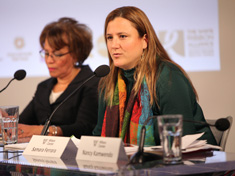-
Samara Ferrara on How Midwifery Can Reduce Unnecessary Surgeries and Save Lives in Mexico
March 31, 2017 By Sean Peoples “Midwives have the knowledge, midwives have the skills, and have the heart and compassion to serve mothers and babies in the most perfect way,” explains Samara Ferrara in this week’s podcast. But they often face demoralizing conditions, poor pay, and in some cases disdain from doctors.
“Midwives have the knowledge, midwives have the skills, and have the heart and compassion to serve mothers and babies in the most perfect way,” explains Samara Ferrara in this week’s podcast. But they often face demoralizing conditions, poor pay, and in some cases disdain from doctors.“Midwives have the knowledge, midwives have the skills, and have the heart and compassion to serve mothers and babies in the most perfect way,” explains Samara Ferrara in this week’s podcast. But they often face demoralizing conditions, poor pay, and in some cases disdain from doctors.
A new survey, Midwives’ Voices, Midwives Realities, reports that “nearly 300,000 women and 2.7 million newborns die during the first 28 days of life, many from preventable causes.” Led by the World Health Organization, International Confederation of Midwives, and White Ribbon Alliance, this first-of-its kind survey highlights how midwives can buttress efforts to reduce maternal and newborn fatalities but also explores the everyday challenges they encounter around the world.
As a young midwifery leader and board member of Mexico’s Midwife Association, Ferrara advocates for a greater role for her colleagues in Mexico’s efforts to make childbirth safer.
“People don’t know what midwifery is about”“Twenty years ago, almost half the births were attended by midwives,” she says of Mexico. Now it is only two percent. “Ninety-five percent of births are attended by physicians, so births are over-medicalized,” she says. Mexico has among the highest rate of cesarean sections in the world.
More midwives could help reduce unnecessary surgeries and the complications that come with them. But there are few opportunities for growth and recognition within the broader health system, Ferrara says, which discourages new midwives and professional advancement. As well, “the hospitals don’t accept home births easily,” making it difficult to register newborns and obtain a birth certificate for practicing midwives and their patients.
“In total we only have 100 midwives in the whole country,” Ferrara says. In fact, there are only five midwifery schools Mexico’s 31 states.
Of the recommendations in the report, Ferrara cited greater educational opportunities as a big first step to bridging the gap between private-practice midwives and the country’s health system. “We need to start by education in every level,” she says, in order “to have more professional ways to advance.”
Additionally, Ferrara points out a public perception gap since “people don’t know what midwifery is about.” In order to raise awareness, she reiterates the important role midwives play in providing quality, safe childrearing expertise. “We know what women need,” says Ferrara, “we know what babies need, and we need to be there providing the highest standard of care.”
Samara Ferrara spoke at the Wilson Center on February 27, 2017.
Friday Podcasts are also available for download on iTunes and Google Podcasts.
 A Publication of the Stimson Center.
A Publication of the Stimson Center.

 “Midwives have the knowledge, midwives have the skills, and have the heart and compassion to serve mothers and babies in the most perfect way,” explains Samara Ferrara in this week’s podcast. But they often face demoralizing conditions, poor pay, and in some cases disdain from doctors.
“Midwives have the knowledge, midwives have the skills, and have the heart and compassion to serve mothers and babies in the most perfect way,” explains Samara Ferrara in this week’s podcast. But they often face demoralizing conditions, poor pay, and in some cases disdain from doctors.

